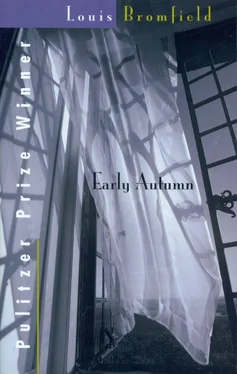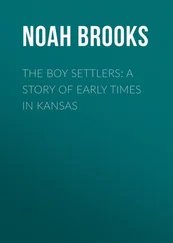John Pentland sighed, profoundly, wearily, and murmured, “It’s nothing, Cassie. It would only trouble you. Olivia and I are settling it.”
But she did not retreat. Standing there, she held her ground and continued the tirade, working herself up to a pitch of hysteria. “I won’t be put aside. No one ever tells me anything. For years now I’ve been shut out as if I were half-witted. Frail as I am, I work myself to the bone for the family and don’t even get a word of thanks. … Why is Olivia always preferred to your own sister?” And tears of luxurious, sensual self-pity began to stream down her withered face. She began even to mumble and mix her words, and she abandoned herself completely to the fleshly pleasure of hysterics.
Olivia, watching her quietly, saw that this was no usual occasion. This was, in truth, the new Aunt Cassie whom Sabine had revealed to her a few days before … the aggressively virginal Aunt Cassie who had been born in that moment on the terrace to take the place of the old Aunt Cassie who had existed always in an aura of tears and good works and sympathy. She understood now what she had never understood before—that Aunt Cassie was not merely an irrational hypochondriac, a harmless, pitiful creature, but a ruthless and unscrupulous force. She knew that behind this emotional debauch there lay some deeply conceived plan. Vaguely she suspected that the plan was aimed at subduing herself, or bringing her (Olivia) completely under the will of the old woman. It was the insect again beating its wings frantically against the windows of a world which she could never enter. …
And softly Olivia said, “Surely, Aunt Cassie, there is no need to make a scene … there’s no need to be vulgar … at a time like this.”
The old woman, suddenly speechless, looked at her brother, but from him there came no sign of aid or succor; she must have seen, plainly, that he had placed himself on the side of Olivia … the outsider, who had dared to accuse a Pentland of being vulgar.
“You heard what she said, John. … You heard what she said! She called your sister vulgar!” But her hysterical mood began to abate suddenly, as if she saw that she had chosen, after all, the wrong plan of attack. Olivia did not answer her. She only sat there, looking pale and patient and beautiful in her black clothes, waiting. It was a moment unfair to Aunt Cassie. No man, even Anson, would have placed himself against Olivia just then.
“If you must know, Cassie …” the old man said slowly. “It’s a thing you won’t want to hear. But if you must know, it is simply that Horace Pentland’s body is at the station in Durham.”
Olivia had a quick sense of the whited sepulchre beginning to crack, to fall slowly into bits.
At first Aunt Cassie only stared at them, snuffling and wiping her red eyes, and then she said, in an amazingly calm voice, “You see. … You never tell me anything. I never knew he was dead.” There was a touch of triumph and vindication in her manner.
“There was no need of telling you, Cassie,” said the old man. “You wouldn’t let his name be spoken in the family for years. It was you—you and Anson—who made me threaten him into living abroad. Why should you care when he died?”
Aunt Cassie showed signs of breaking down once more. “You see, I’m always blamed for everything. I was thinking of the family all these years. We couldn’t have Horace running around loose in Boston.” She broke off with a sudden, fastidious gesture of disgust, as if she were washing her hands of the whole affair. “I could have managed it better myself. He ought never to have been brought home … to stir it all up again.”
Still Olivia kept silent and it was the old man who answered Aunt Cassie. “He wanted to be buried here. … He wrote to ask me, when he was dying.”
“He had no right to make such a request. He forfeited all rights by his behavior. I say it again and I’ll keep on saying it. He ought never to have been brought back here … after people even forgot whether he was alive or dead.”
The perilous calm had settled over Olivia. … She had been looking out of the window across the marshes into the distance, and when she turned she spoke with a terrible quietness. She said: “You may do with Horace Pentland’s body what you like. It is more your affair than mine, for I never saw him in my life. But it is my son who is dead … my son, who belongs to me more than to any of you. You may bury Horace Pentland on the same day … at the same service, even in the same grave. Things like that can’t matter very much after death. You can’t go on pretending forever. … Death is too strong for that. It’s stronger than any of us puny creatures because it’s the one truth we can’t avoid. It’s got nothing to do with prejudices and pride and respectability. In a hundred years—even in a year, in a month, what will it matter what we’ve done with Horace Pentland’s body?”
She rose, still enveloped in the perilous calm, and said: “I’ll leave Horace Pentland to you two. There is none of his blood in my veins. Whatever you do, I shall not object … only I wouldn’t be too shabby in dealing with death.”
She went out, leaving Aunt Cassie exhausted and breathless and confused. The old woman had won her battle about the burial of Horace Pentland, yet she had suffered a great defeat. She must have seen that she had really lost everything, for Olivia somehow had gone to the root of things, in the presence of John Pentland, who was himself so near to death. (Olivia daring to say proudly, as if she actually scorned the Pentland name, “There is none of his blood in my veins.”)
But it was a defeat which Olivia knew she would never admit: that was one of the qualities which made it impossible to deal with Aunt Cassie. Perhaps, even as she sat there dabbing at her eyes, she was choosing new weapons for a struggle which had come at last into the open because it was impossible any longer to do battle through so weak and shifting an ally as Anson.
She was a natural martyr, Aunt Cassie. Martyrdom was the great feminine weapon of her Victorian day and she was practiced in it; she had learned all its subtleties in the years she had lain wrapped in a shawl on a sofa subduing the full-blooded Mr. Struthers.
And Olivia knew as she left the room that in the future she would have to deal with a poor, abused, invalid aunt who gave all her strength in doing good works and received in return only cruelty and heartlessness from an outsider, from an intruder, a kind of adventuress who had wormed her way into the heart of the Pentland family. Aunt Cassie, by a kind of art of which she possessed the secret, would somehow make it all seem so.
2
The heat did not go away. It hung in a quivering cloud over the whole countryside, enveloping the black procession which moved through the lanes into the highroad and thence through the clusters of ugly stucco bungalows inhabited by the millworkers, on its way past the deserted meeting house where Preserved Pentland had once harangued a tough and sturdy congregation and the Rev. Josiah Milford had set out with his flock for the Western Reserve. … It enveloped the black, slow-moving procession to the very doors of the cool, ivy-covered stone church (built like a stage piece to imitate some English country church) where the Pentlands worshiped the more polite, compromising gods scorned and berated by the witch-burner. On the way, beneath the elms of High Street, Polish women and children stopped to stare and cross themselves at the sight of the grand procession.
The little church seemed peaceful after the heat and the stir of the Durham street, peaceful and hushed and crowded to the doors by the relatives and connections of the family. Even the back pews were filled by the poor half-forgotten remnants of the family who had no wealth to carry them smoothly along the stream of life. Old Mrs. Featherstone (who did washing) was there sobbing because she sobbed at all funerals, and old Miss Haddon, the genteel Pentland cousin, dressed even in the midst of summer in her inevitable cape of thick black broadcloth, and Mrs. Malson, shabby-genteel in her foulards and high-pitched bonnet, and Miss Murgatroyd, whose bullfinch house was now “Ye Witch’s Broome” where one got bad tea and melancholy sandwiches. …
Читать дальше












